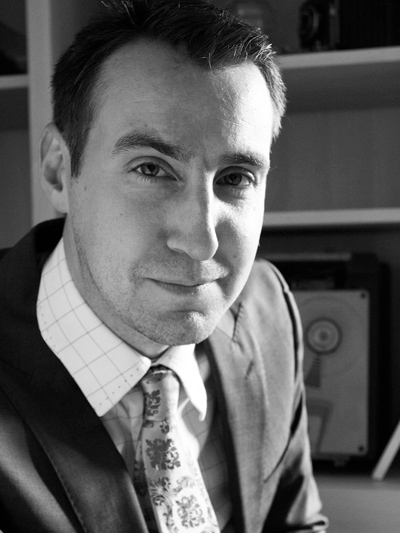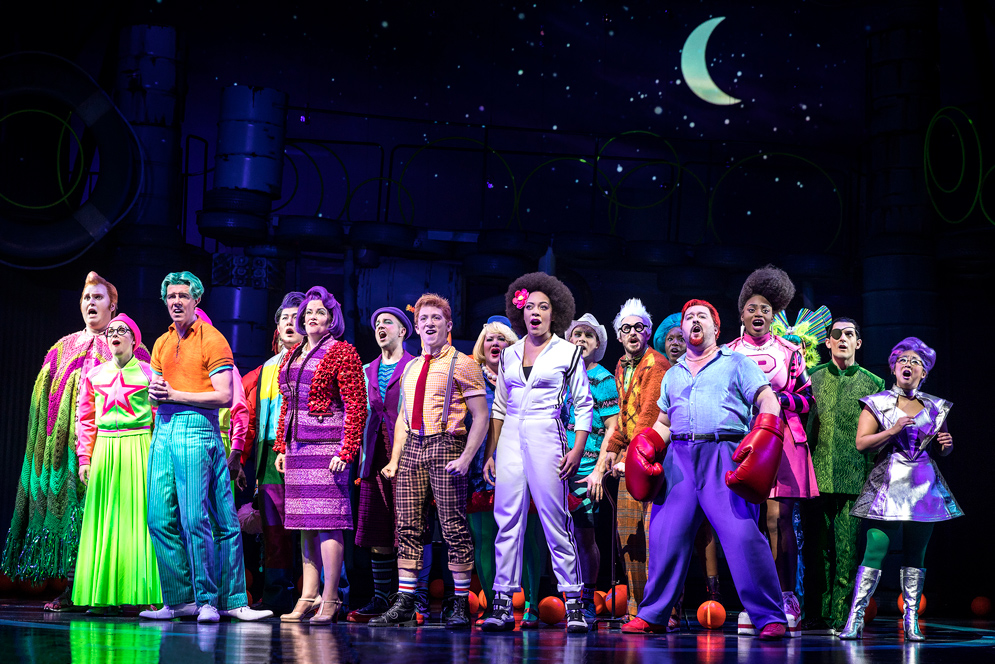SpongeBob SquarePants Earns CFA Alum Tony Award Nod
Walter Trarbach (CFA'02) nominated for best sound design of a musical

Ethan Slater (center) as the title character, with the company of SpongeBob SquarePants: The Broadway Musical. Photo by Joan Marcus
When the Broadway community gathers at Radio City Music Hall in New York Sunday night to confer this year’s Tony Awards—the American theater’s highest accolade—they will welcome back two categories that were abruptly eliminated five years ago: best sound design of a musical and best sound design of a play. And for one BU alum, the timing couldn’t be better.
Walter Trarbach (CFA’02), a veteran theatrical sound designer, along with his colleague, Mike Dobson, has received his first Tony nomination for his work on one of this season’s biggest hits, SpongeBob SquarePants: The Broadway Musical. Based on the popular, long-running Nickelodeon cartoon show, the $20 million musical earned 12 Tony nominations.
Five years ago, the Tony Awards administration committee eliminated the sound design categories, without citing a reason. The decision caused an uproar in the theater community, but also led to a groundswell of support for the complicated, nuanced work that sound designers bring to the stage.
“A lot of people believed it was the wrong choice, but it took some time to work through the process of restoring the award,” says Trarbach, who has worked on such shows as the 2012 Broadway revival of Jesus Christ Superstar; 2013’s 700 Sundays, Billy Crystal’s one-man show; and 2015’s Doctor Zhivago.
Being nominated has been both gratifying and overwhelming, the designer says. “A lot of my friends and colleagues have reached out to me with congratulations.”
Sound designers are responsible for virtually everything heard in a theatrical production. Their work involves creating sound effects and sonic atmospheres that aid in the dramatic presentation of the performance, and the audience’s emotional connection with it. They advise on how to best hear the performers and orchestra, including acoustic adjustments to the theater and set, or the configuration of radio and/or float mics for the performers.
Asked to describe his style, Trarbach says simply, “If I can’t hear something, I make it louder. If I think it’s too loud, I turn it down.”

Plays and musicals “are two different worlds,” he says. While vocal enforcement is sometimes needed in plays, the emphasis is usually on sound effects, ambience, or scene transition music. “When working on a musical, the primary focus is on making sure the audience can hear and enjoy the music and dialogue,” Trarbach explains. “Generally, speaking, there are fewer sound effects in a musical.”
Trarbach began working in theater as a junior high school student in Appleton, Wis. His older sister was working at the venerable Attic Theatre, and it looked like fun. He worked backstage, helping with lighting and stage management, and was soon hooked.
When he arrived at the College of Fine Arts’ School of Theatre, Trarbach chose to study sound design, not lighting. “I didn’t know much about it, but I had an appreciation for music and technology,” he says. “The best part of my time at BU was everything I learned from my classmates. I was very fortunate to be there with a great group of people. I still keep in touch with a lot of them, and we often work together professionally.”
After graduating, he moved to New York, supporting himself mostly by doing carpentry for shows. Joel Brandwine, a CFA assistant professor in the School of Theatre, introduced him to a lot of production managers at Off-Broadway theaters, and Trarbach began landing jobs as an associate sound designer. He moved on to La Jolla Playhouse in California, and while there, met sound designer Steve Kennedy who invited him to work as his associate on 700 Sundays when it moved to Broadway.
“I said yes to as many jobs as I could, and tried not to mess them up,” he says.
Trarbach has been working on SpongeBob for six years. He was approached by Susan Vargo, the musical’s producer and the head of live entertainment for Nickelodeon. They’d met when he was a student at BU. He hadn’t seen a single episode of the TV show, and when they started work-shopping the musical, there wasn’t even a script to work with. Over the next several years, more workshops took place, and he and Foley designer Mike Dobson continued to try out new sounds with the actors. “We got to grow the sound design of the show right along with its overall development,” Trarbach says, adding that that’s rare for a Broadway musical. “This allowed us to integrate sound design into every facet of the production.”
Every show, he says, has its own set of demands. “Sometimes the scenery will be in the way of ideal speaker positions or the costume design of a musical will include hats over an actor’s microphone, rendering it ineffective.”

The company of SpongeBob SquarePants: The Broadway Musical. Photo by Joan Marcus
The biggest challenge on SpongeBob was the sheer scale of the project, he says. In addition to designing the sound for a huge Broadway musical, Trarbach had to create hundreds of sound effects, including a rumbling volcano, a cowbell that goes off each time a character hits their head during the show, and replicating the little squeak that SpongeBob makes each time he walks, made famous by the Nickelodeon cartoon. The show’s tap dancing numbers and the fact that all of the actors play instruments onstage posed additional complications. “In terms of the amount of sound in a show, SpongeBob will likely prove to be the biggest of my career,” he says.
Trarbach plans to have an acceptance speech on hand Sunday night “just in case.” And if early predictions are any indication, he’s going to need it. Both TimeOut New York and OnStage Blog are predicting a win for him and Dobson in the best sound design of a musical category.
Other nominations involving BU alums this year are: for best revival of a musical, producers Brian Cromwell Smith (Questrom’96) for Once on This Island and Sue Wagner (CFA’97) for Carousel; for best revival of a play, Diana DiMenna (COM’85) for Three Tall Women and Wagner for Three Tall Women and The Iceman Cometh; and for best musical, Frederick Zollo (CAS’75) for The Band’s Visit.
The 72nd annual Tony Awards will be broadcast Sunday, June 10, on CBS at 8 pm. A list of this year’s nominees is here.
Comments & Discussion
Boston University moderates comments to facilitate an informed, substantive, civil conversation. Abusive, profane, self-promotional, misleading, incoherent or off-topic comments will be rejected. Moderators are staffed during regular business hours (EST) and can only accept comments written in English. Statistics or facts must include a citation or a link to the citation.